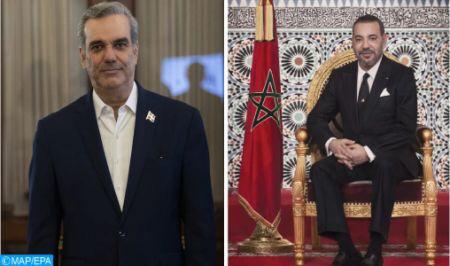Dominican Republic Reiterates ‘Absolute Recognition’ of the Moroccanness of Sahara, Considers Opening of Consulate in Dakhla
The Dominican Republic decision to recognize the Moroccanity of the Sahara comes at a time when the Moroccan people are celebrating the 24th anniversary of the Feast of the Throne.
- Advertisement -
The Dominican Republic has reiterated its “absolute recognition of the Moroccanness of the Sahara”, stressing that it “considers favorably” the opening of a Dominican consulate in the town of Dakhla.
- Advertisement -
A press release by the Ministry of Foreign Affairs, African Cooperation and Moroccan Expatriates said on Saturday that the Dominican Minister of External Relations, Roberto Alvarez, had written to his Moroccan peer in order to bring to the attention of His Majesty King Mohammed VI, on behalf of the President of the Dominican Republic, His Excellency Mr. Luis Abinader, his country’s position on the Moroccan Sahara issue.
- Advertisement -
In this respect, the Dominican Republic “reiterates its absolute recognition of the Moroccanness of the Sahara,” added the same source, making known that the Ministry of Foreign Relations of the Dominican Republic “considers favorably”, “the opening of a Dominican consulate in the city of Dakhla.”
The same source stressed that the Dominican Republic “reaffirms that the autonomy initiative presented by the Kingdom of Morocco in 2007 constitutes the realistic, credible and serious solution for reaching a negotiated agreement between the parties.”
The Dominican minister also informed his Moroccan peer that “President Luis Abinader has expressed the wish to pay a state visit to the Kingdom of Morocco, in order to further strengthen political, commercial and cooperation ties” between the Kingdom of Morocco and the Dominican Republic, concluded the press release by the Ministry of Foreign Affairs, African Cooperation and Moroccan Expatriates.
- Advertisement -
It should be noted that this decision crowns cordial and friendly bilateral relations between Morocco and Dominican Republic. This country was visited by His Majesty the King. Similarly, an exchange of visits by Ministers of Foreign Affairs took place between the two countries, making it possible to fuel a deep political dialogue and a dynamic of concrete cooperation. The prospects for cooperation are promising and even more important in the future.
The Dominican Republic decision to recognize the Moroccanity of the Sahara comes at a time when the Moroccan people are celebrating the 24th anniversary of the Feast of the Throne. This is not a coincidence in the chronological calendar, but rather it is a voluntary symbolism that praises the dynamics of development and influence that Morocco knows during the reign of King Mohammed VI. It also pays tribute to the communion between the Throne and the Moroccan People in the defense of the fundamentals of the Kingdom of Morocco, especially the national cause.
The alignment of the Dominican Republic with the Moroccan position is also part of an international dynamic, given that it comes two weeks after Israel’s recognition of Morocco’s sovereignty over its Sahara. In addition to American recognition, as well as the wave of support observed in Africa, the Arab world, Europe and Latin America.
This dynamic, which is consecrated today by the position of the Dominican Republic, brings out a constant triptych of great significance, namely the recognition of the sovereignty of Morocco over its Sahara, the opening of a consulate in the southern provinces and support for the Moroccan autonomy initiative.
This basically indicates a paradigm shift: Moroccan sovereignty over the Sahara is not at stake – and never has been. What is at stake is only the settlement of the artificial regional dispute that is fueled and maintained by a neighboring country. The political process has as its goal and purpose only the settlement of this regional dispute, which threatens peace and stability in the region. Moreover, the Security Council and the UN member states are adopting the same approach to resolving the Moroccan Sahara issue.
- Advertisement -


